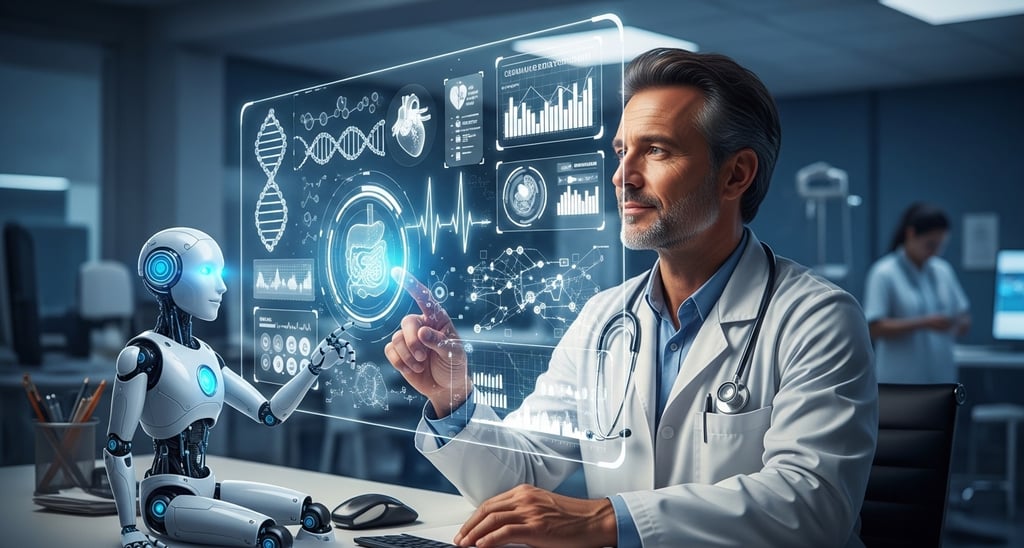Your Doctor's New Best Friend: How AI is Quietly Changing Everything About Healthcare
Remember when getting an X-ray meant waiting weeks for results? Or when your doctor had to rely purely on experience and intuition to diagnose that mysterious symptom? Those days are fading fast. Artificial intelligence isn't just knocking on healthcare's door anymore it's already moved in, made itself comfortable, and is revolutionizing how we stay healthy. But here's the thing: this isn't about robots replacing your family doctor. It's about giving them superpowers.
ARTIFICIAL INTELLIGENCETECHNOLOGYHEALTHCARE
Hitanshu Soni
7/30/20256 min read


When Computers Started Seeing Things We Couldn't
Let me tell you about Sarah, a 45-year-old teacher who went for her routine mammogram last year. The radiologist initially gave her the all-clear, but an AI system flagged something tiny barely visible to the human eye. That "something" turned out to be early-stage breast cancer. Thanks to catching it so early, Sarah's treatment was simple and successful.
This happens more often than you'd think. AI systems are now reading medical scans with incredible accuracy, sometimes catching things that even experienced doctors miss. Google's AI can spot over 50 different eye diseases just by looking at a photo of your retina. IBM's Watson is helping oncologists choose the best cancer treatments by analyzing thousands of similar cases in seconds.
The cool part? You don't need to live near a major hospital to benefit. A smartphone app can now analyze a photo of a suspicious mole and tell you if it's worth worrying about. In rural areas where specialists are rare, AI is bringing expert-level diagnosis to people who previously had to travel hundreds of miles for answers.
Medicine That's Actually Made for You
Here's something that might surprise you: that headache medication that works wonders for your friend might be completely useless for you. We're all walking around with different genetic codes, different metabolisms, and different ways our bodies process drugs. AI is finally helping doctors figure out what will actually work for each individual person.
Companies are now analyzing your DNA alongside your medical history to predict which medications will help you and which ones might cause nasty side effects. For cancer patients, this is already saving lives. Instead of trying treatment after treatment hoping something works, doctors can now look at the specific genetic mutations in someone's tumor and choose targeted therapies that are much more likely to succeed.
It's like having a treatment plan written specifically for your body's instruction manual.
The Race to Find New Medicines Just Got Faster
You know how we always hear that new drugs take forever to develop? Well, AI is changing that game too. What used to take pharmaceutical companies 10-15 years and billions of dollars is now happening much faster.
During COVID-19, we saw this in action. Moderna used AI to design their vaccine in just two days after scientists shared the virus's genetic code. Sure, testing it safely still took months, but that initial breakthrough happened at lightning speed compared to traditional methods.
AI is also playing detective with existing drugs, figuring out if medicines we already have might treat completely different conditions. Imagine if that blood pressure medication sitting in pharmacies everywhere could also help with Alzheimer's AI is helping us discover connections like that.
Surgery with Steady (Robot) Hands
I'll be honest the idea of a robot performing surgery sounds terrifying at first. But when you learn that these systems can eliminate the tiny hand tremors that even the best surgeons have, and work through incisions smaller than traditional surgery requires, it starts to make sense.
The da Vinci robot has already been used in over 8 million surgeries worldwide. Surgeons control it like a sophisticated video game, but with incredibly precise instruments that can move in ways human hands simply cannot. Patients heal faster, have less scarring, and often get to go home sooner.
Some newer systems can even perform certain parts of operations independently like perfect stitching that's more consistent than any human could achieve. Don't worry though, there's always a human surgeon overseeing everything.
Your Smartwatch Might Save Your Life
This one hits close to home for a lot of us. How many people do you know who wear fitness trackers or smartwatches? Those devices are getting scary good at spotting health problems before you even feel sick.
Hospitals are using AI to predict which patients might develop sepsis or go into heart failure hours before it actually happens. The Veterans Affairs hospitals have an AI system that can predict kidney problems up to two days in advance. When you're talking about life-threatening conditions, those extra hours or days can mean everything.
Your Apple Watch or Fitbit is constantly monitoring your heart rhythm, and people are discovering they have atrial fibrillation a serious heart condition just from getting an alert on their wrist. Some folks had no idea anything was wrong until their watch told them to see a doctor.
Mental Health Gets a 24/7 Helper
Mental health care has always been deeply personal and human, but AI is finding ways to help here too. Chatbots like Woebot aren't trying to replace therapists, but they're available at 3 AM when you're having a panic attack and can't reach anyone else.
These AI systems can spot patterns in how you text, how your voice sounds, or even how you use your phone that might indicate you're sliding into depression or anxiety. It's like having an early warning system for your mental health.
Of course, nothing beats talking to a real human therapist, but for many people, AI provides that crucial first step or fills in the gaps between appointments.
The Challenges We Can't Ignore
Now, let's talk about the elephant in the room. All this AI magic comes with some real concerns that we need to address.
First, there's the privacy issue. These systems need enormous amounts of medical data to work properly, which means your most personal health information is being stored and analyzed by computers. Companies promise it's secure, but we've all heard about data breaches.
Then there's the bias problem. If an AI system is trained mostly on data from white males, it might not work as well for women or people of color. Some studies have already found that certain AI diagnostic tools perform differently for different ethnic groups, which could make existing health disparities even worse.
And here's something that keeps doctors up at night: when an AI system says "give this patient medication X," it's often impossible to understand exactly why it made that recommendation. Do you trust a treatment suggestion when even the experts can't explain the reasoning?
Navigating the Rules
The FDA is trying to keep up with all this innovation, but it's like trying to regulate a rocket ship while it's launching. They've approved over 300 AI medical devices so far, but new ones are being developed faster than regulators can evaluate them.
The challenge is making sure these systems are safe and effective without slowing down potentially life-saving innovations. It's a balancing act that affects all of us.
What This Means for Your Doctor
You might wonder if AI will replace doctors entirely. The short answer is no at least not anytime soon. What's happening instead is that AI is taking over the routine, time-consuming parts of medicine so doctors can focus on what they do best: talking to patients, making complex decisions, and providing the human touch that no algorithm can replicate.
Think about it this way: would you rather have your doctor spend time manually reviewing hundreds of test results, or have AI handle that analysis so your doctor can spend more time actually talking with you about your concerns?
The doctor-patient relationship is still fundamentally human. AI can't hold your hand when you get scary news, can't understand why you're reluctant to take a certain medication because of past experiences, and can't make nuanced decisions that take your family situation and personal values into account.
What's Coming Next
The next few years are going to bring changes that sound like science fiction. Quantum computers might help AI understand biological systems in ways we never thought possible. Brain-computer interfaces could help paralyzed people control prosthetic limbs with their thoughts. AI might even help us grow replacement organs in labs.
Telemedicine, which exploded during the pandemic, is getting smarter too. Soon you might have video appointments where AI analyzes your skin condition, listens to your cough, or even examines your throat through your phone's camera.
Digital twins basically AI models of your specific body could let doctors test treatments virtually before trying them on you. Imagine being able to see how a medication would affect your body before you ever take the first pill.
The Bottom Line
AI in healthcare isn't about replacing the human element in medicine it's about enhancing it. It's about catching diseases earlier, personalizing treatments, and giving doctors tools that help them help you better.
Yes, there are challenges around privacy, bias, and regulation that we need to solve. But the potential benefits are enormous: more accurate diagnoses, treatments tailored to your specific needs, and healthcare that's accessible to more people regardless of where they live.
The future of healthcare is a partnership between human compassion and artificial intelligence. Your doctor will still be human, but they'll have AI as their incredibly smart, never-tired, always-learning assistant. And honestly? That sounds like a pretty good deal for all of us.
The stethoscope isn't going anywhere it's just getting some very sophisticated company.


Hitanshu Soni
Software Developer Engineer at SportVot
